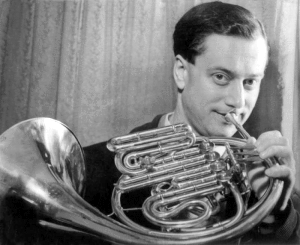
Dennis Brain was a British horn player. From a musical family – his father and grandfather were horn players – he attended the Royal Academy of Music in London. During the Second World War he served in the Royal Air Force, playing in its band and orchestra. After the war he was principal horn of the Philharmonia and Royal Philharmonic orchestras, and played in chamber ensembles.
The "Lyke-Wake Dirge" is a traditional English folk song and dirge listed as number 8194 in the Roud Folk Song Index. The song tells of the soul's travel, and the hazards it faces, on its way from earth to purgatory. Though it is from the Christian era and features references to Christianity, much of the symbolism is thought to be of pre-Christian origin.

Consecration is the transfer of a person or a thing to the sacred sphere for a special purpose or service. The word consecration literally means "association with the sacred". Persons, places, or things can be consecrated, and the term is used in various ways by different groups. The origin of the word comes from the Latin stem consecrat, which means dedicated, devoted, and sacred. A synonym for consecration is sanctification; its antonym is desecration.
The kontakion is a form of hymn performed in the Orthodox and the Eastern Catholic liturgical traditions.

A Ceremony of Carols, Op. 28 is an extended choral composition for Christmas by Benjamin Britten scored for three-part treble chorus, solo voices, and harp. The text, structured in eleven movements, is taken from The English Galaxy of Shorter Poems, edited by Gerald Bullett. It is principally in Middle English, with some Latin and Early Modern English. It was composed in 1942 on Britten's sea voyage from the United States to England.
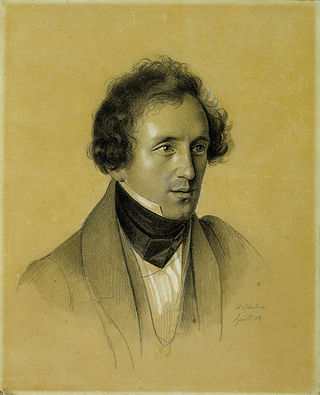
St. Paul, Op. 36, is an oratorio by Felix Mendelssohn. The composer oversaw versions and performances in both German and English within months of completing the music in early 1836.
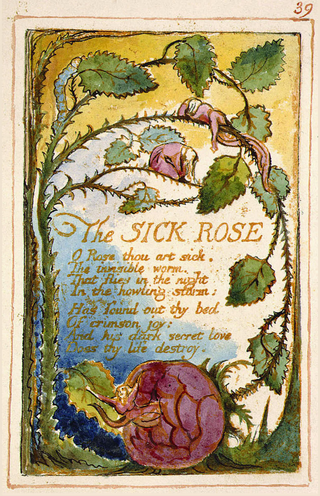
"The Sick Rose" is a poem by William Blake, originally published in Songs of Innocence and of Experience as the 39th plate; the incipit of the poem is O Rose thou art sick. Blake composed the poem sometime after 1789, and presented it with an illuminated border and illustration, typical of his self-publications. Since the 20th century, the poem has been the subject of scrutiny by scholars for its oblique and enigmatic meaning, and bizarre, suggestive imagery.

Hodie is a cantata by Ralph Vaughan Williams. Composed between 1953 and 1954, it is the composer's last major choral-orchestral composition, and was premiered under his baton at Worcester Cathedral, as part of the Three Choirs Festival, on 8 September 1954. The piece is dedicated to Herbert Howells. The cantata, in 16 movements, is scored for chorus, boys' choir, organ and orchestra, and features tenor, baritone, and soprano soloists.

The alma mater of the University of Pittsburgh was adopted soon after the University changed its name in 1908 from the Western University of Pennsylvania to its current moniker. Lyrics were written by George M. P. Baird, class of 1909 and were set to the tune of what was then the Austrian National Anthem. A new tune for the "Alma Mater" hymn was composed by Charles W. Scovel, class of 1883, but it was not widely adopted and was either lost or became obscure.
The Cantata by Igor Stravinsky is a work for soprano, tenor, female choir, and instrumental ensemble, and was composed from April 1951 to August 1952. The premiere performance on 11 November 1952 was by the Los Angeles (Chamber) Symphony Society, conducted by Stravinsky himself. After completing the opera The Rake's Progress, Stravinsky felt the urge to compose another work setting English words, but in a non-dramatic form.
Coronation Ode, Op. 44 is a work composed by Edward Elgar for soprano, alto, tenor and bass soloists, chorus and orchestra, with words by A. C. Benson.
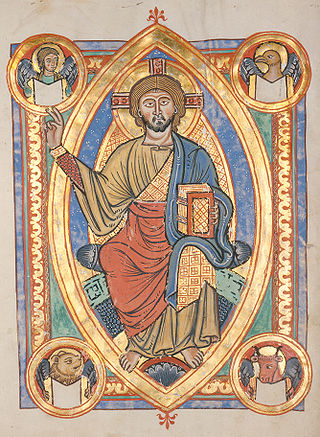
Saint Louis de Montfort's Prayer to Jesus is a reflection of his philosophy of "total consecration to Jesus Christ through Mary", a theme that centuries later influenced the development of Roman Catholic Mariology.
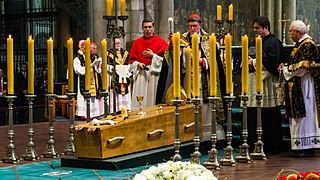
Absolution of the dead is a prayer for or a declaration of absolution of a dead person's sins that takes place at the person's religious funeral.
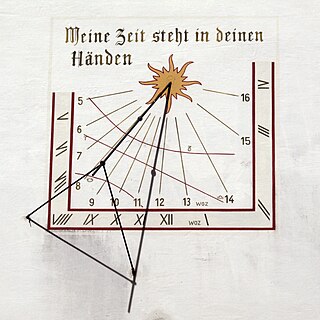
Psalm 31 is the 31st psalm of the Book of Psalms, beginning in English in the King James Version: "In thee, O LORD, do I put my trust". In Latin, it is known as "In te Domine speravi". The Book of Psalms is part of the third section of the Hebrew Bible, and a book of the Christian Old Testament. In the slightly different numbering system used in the Greek Septuagint version of the Bible, and in its Latin translation, the Vulgate, this psalm is Psalm 30. The first verse in the Hebrew text indicates that it was composed by David.

Psalm 71 is the 71st psalm of the Book of Psalms, beginning in English in the King James Version: "In thee, O LORD, do I put my trust: let me never be put to confusion". It has no title in the Hebrew version. In the slightly different numbering system used in the Greek Septuagint and Latin Vulgate translations of the Bible, this psalm is Psalm 70. In Latin, it is known as "In te Domine speravi".

Spiritual communion is a Christian practice of desiring union with Jesus Christ in the Eucharist. It is used as a preparation for Mass and by individuals who cannot receive holy communion.
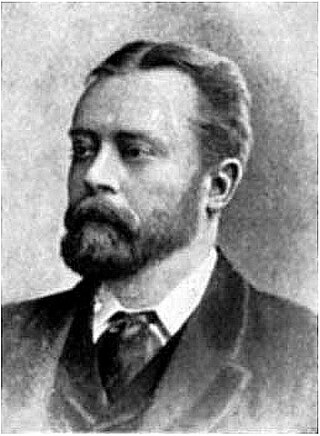
Edwin James Milliken, was a Punch editor, journalist, satirical humorist and poet. He is best known for his oft-quoted poem "Death and his brother sleep", notably quoted by Winston Churchill in the prelude to World War II when he felt that parliament was not taking the prospect of a war against Hitler seriously enough. He produced a series of comic poems published as The 'Arry Papers between 1874 and 1897. He worked as journalist on the London Figaro in 1872 and joined Punch in 1877. His creation of 'Arry, a bombastic Cockney, resulted in a successful series of poems which were hailed for their phonetic precision. Milliken described 'Arry as "really appalling. He is not a creature to be laughed at or with." In 1883 he published The Modern Ars Amandi.

"Sonnet X", also known by its opening words as "Death Be Not Proud", is a fourteen-line poem, or sonnet, by English poet John Donne (1572–1631), one of the leading figures in the metaphysical poets group of seventeenth-century English literature. Written between February and August 1609, it was first published posthumously in 1633.
The 66 Chorale improvisations for organ, Op. 65, were composed by Sigfrid Karg-Elert between 1906 and 1908, and first published in six volumes in 1909. The composition was dedicated to "the great organist Alexandre Guilmant".

"Vom Himmel hoch, da komm ich her" is a hymn text relating to the Nativity of Jesus, written by Martin Luther in 1534. The hymn is most often sung to the melody, Zahn No. 346, which first appeared in a 1539 songbook and was probably also composed by Luther. This classic Christmas carol remains popular and has inspired many choral and organ works by other composers.















